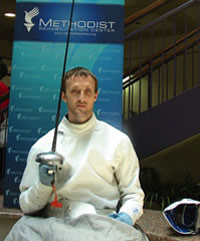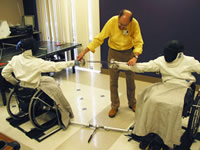JACKSON, Miss. – Eliminate fancy footwork from the sport of fencing and you might expect to sacrifice some excitement. But that’s hardly the case when the swords are in the hands of the Mississippi Blade Rollers.
Members of Methodist Rehabilitation Center’s wheelchair fencing team say their sport features the same thrills as traditional swordplay and may actually be more combative. "It’s in your face," says 30-year-old Joey Brinson of Brandon. "You can’t run anywhere."
Brinson and his fellow swashbucklers will be in the spotlight on June 17 when they join the competition at the State Games of Mississippi in Meridian. David Williams of Ridgeland – a volunteer coach for the Blade Rollers and fencing commissioner for the games – added wheelchair fencing to the competition roster for the first time this year.
"I think it’s a real good addition," Williams said. "When you work hard and train a lot, it’s sort of a reward to go to a tournament." It also should be a treat for spectators, who have likely never seen the sport. "I think the nearest group of wheelchair fencers is in Atlanta," he said.
Pete Collman, an internationally ranked competitor and former captain of the Shepherd Swords team in Atlanta, helped introduce wheelchair fencing in Mississippi via a July, 2006 clinic hosted by Methodist Rehab. "We’re always looking for new activities and fencing is one that suits a wide variety of wheelchair users," says Ginny Boydston, therapeutic recreation director for the Jackson hospital. "The sport is suitable for amputees and paraplegics and can be adapted for some quadriplegics."
The rules of fencing are the same for disabled and able-bodied competitors, with a few exceptions. Wheelchair fencers lock their chairs into metal frames to avoid tipping over. They stay seated and keep their feet on the footrest during competition. The fencer with the shortest arms decides whether the playing area will be at his distance or his opponent’s. Scoring is done electronically, and points are awarded when the weapon touches a specific target area.
"In some ways, wheelchair fencing is faster and more intense," says Richard Jones of Clinton, chairman of the Arkansas-Mississippi-Louisiana division of the U.S. Fencing Association and another volunteer coach for the Blade Rollers. "Able-bodied fencers use their feet to gain distance from an attack, while wheelchair fencers are confined in a chair within reach of their opponents. It’s more like a close in-fighting position and that ups the intensity."
That intensity appeals to Brinson, but he says he also has come to appreciate the intellectual nature of the sport. "Physical chess is a good way to explain it," he says. "It requires a lot of thinking and strategy. It makes you use your brain."
Boydston said funding from Methodist Rehab, Ameristar Casino Vicksburg and the Mississippi Paralysis Association made it possible to purchase the wheelchair frames, swords, scoring equipment and uniforms necessary for the sport. And she says the eight-member team is also fortunate to have volunteer coaches from the Clinton Fencing Club.
The State Games won’t be the first competitive arena for the Mississippi Blade Rollers. The team recently participated in the Dixie Games in Birmingham, and Boydston says the group "held their own." "We competed against Shepherd and it has several Paralympic wheelchair athletes on its team."
Since that tournament, team members have been meeting weekly to improve their skills. "It takes a lot of practice," says 25-year-old Dejuan Surrell of Jackson. "But I want to be the best I can be. It’s making me feel more confident showing people I can do this."


